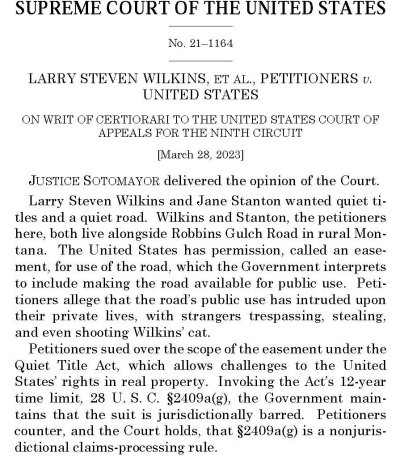
We all know by now that the Supreme Court recently has been on a tear about federal statutes of limitations, and is policing up a lot of earlier too-casual language in some of its opinions about whether this SOL or that SOL is “jurisdictional.” In a series of opinions over the last few years, the Court has almost universally confirmed that it used the term rather loosely, and that upon further review, many statutes of limitations are not “jurisdictional” but are “claims processing rules.”
The Court’s 6-3 opinion in Wilkins v. United States, No. 21-1164 (Mar. 28, 2023) is another in a line of decisions so holding. Wilkins involves the Federal Quiet Title Act’s 12-year SOL (see this preview of the issues by our friend and colleague Stephen Davis). The bottom line is that Wilkins concluded the QTA’s SOL is a claims processing rule because Congress did not “clearly state” that the SOL is jurisdictional.
We’ll leave it to you to read the six-Justice majority opinion authored by Justice Sotomayor, and the three-Justice dissent authored by Justice Thomas, because this case is one where our law firm represents a party, the prevailing petitioners. Our colleague Jeffrey McCoy argued the case a couple of months ago (nice job, Jeff!).
Unfortunately, a lot of the reporting on the decision treat it as a wonky, technical issue (which, admittedly, it is), but in so doing regrettably overlook the importance of the case. For the reasons why we think it is very important, read this. And for some of the reporting that gets why the case is important (and which note the somewhat unexpected line up of Justices) see:
- Liberals unite with Trump Supreme Court nominees in decision against federal land grab (Washington Examiner)
- Victory for Property Rights in Highly Technical Supreme Court Decision (Ilya Somin, Volokh Conspiracy)
The bottom line is that the property owners will get their day in court, and not get tossed out for an arcane, overly-technical reason. And that sounds like a very good thing.